Tohoku University
Tohoku University (東北大学, Tōhoku daigaku), or Tohokudai (東北大, Tōhokudai), is a Japanese national university located in Sendai, Miyagi in the Tōhoku Region, Japan. It is informally referred to as Tonpei (トンペイ, Tonpei). Established in 1907, it was the third Imperial University in Japan and among the first three Designated National Universities, along with the University of Tokyo and Kyoto University.[1] Tohoku University is a Top Type university of the Top Global University Project, and since 2020 has been ranked the best university in Japan by Times Higher Education.[2][3][4]
東北大学 | |
 | |
| Motto |
|
|---|---|
| Type | Public (National) |
| Established | June 22, 1907 |
Academic affiliations | APRU, AEARU, HeKKSaGOn, T.I.M.E., RENKEI |
| Endowment | US$1.3 billion (JP¥120,138 billion) |
| President | Hideo Ohno |
Administrative staff | 5,756 |
| Undergraduates | 11,094 |
| Postgraduates | 7,704 |
Other students | 1,346 (international students) |
| Location | , Japan |
| Campus | Urban, 250 ha (620 acres) |
| Colors | Purple |
Sporting affiliations | TCAA, SEN6 |
| Website | www |
In 2016, Tohoku University had 10 faculties, 16 graduate schools and 6 research institutes, with a total enrollment of 17,885 students.[5] The university's three core values are "Research First (研究第一主義)," "Open-Doors (門戸開放)," and "Practice-Oriented Research and Education (実学尊重)."
History
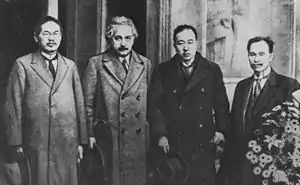
.JPG.webp)
On June 22, 1907(明治40年,Mēji yonjyunen), the university was established under the name Tohoku Imperial University (東北帝國大學, Tōhoku teikoku daigaku) by the Meiji government as the third Imperial University of Japan, following the Tokyo Imperial University (1877) and the Kyoto Imperial University (1897). From its start, it has advocated "Open-door" policies—it was the first university in Japan to accept female students (in 1913)[6] and foreign students.
In September 1907, it set up the faculty of Agriculture in Sapporo; the Sapporo Agricultural College (札幌農學校, Sapporo nō gakkō).
It set up the Science Department in 1911, and the Medical Department (formerly the Sendai Medical College) in 1915. In 1918 it ceded the Faculty of Agriculture to Hokkaido Imperial University. It subsequently launched Faculties of Engineering in 1919, and Law and Literature in 1922.[7]
In 1947 the university assumed its current name, Tohoku University, and acquired a new Faculty of Agriculture. In 1949, the Faculty of Law and Literature was split to form new faculties of Law, Literature, and Economics. A Faculty of Education was added in 1949, Dentistry in 1965, and Pharmacy in 1972. Tohoku has been a National University Corporation since April 2004.[7]
2011 Tōhoku earthquake
Subsequent to the 2011 Tōhoku earthquake and tsunami, the university was declared closed until further notice, but with a tentative re-opening date of the end of the following April.[8]
The Aobayama, Katahira, Amamiya, and Kawauchi campuses are all at least 12 kilometers (7.5 mi) from the ocean, towards the mountains, and therefore suffered no damage resulting from the tsunami. No deaths or serious injuries within the faculty and student body were reported on campus grounds. However, earthquake damage lead to the closure of 27 buildings and caused millions of dollars of damage to equipment. Classes have resumed normally since early May 2011 and plans for restoring, reinforcing or replacing damaged buildings are underway.
The radiology department has been actively measuring radiation levels throughout the city of Sendai since the Fukushima Nuclear Power Plant meltdown, which is about 100 kilometers south. So far no alarming levels of radiation have been detected.
Campuses
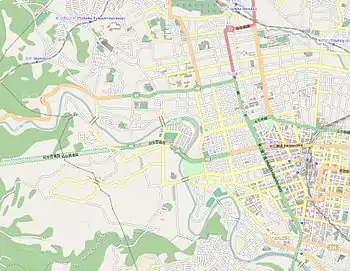
Principal four campuses are in the Sendai City, Japan;
- Katahira (片平, Katahira)
- Administration Unit. and Principal institutes
- Kawauchi (川内, Kawauchi)
- North-Kawauchi; The freshmen and sophomore of all undergraduates
- South-Kawauchi; Law, Education, Economics, Letters
- Seiryo (星陵, Seiryō)
- Medicine, Dentistry
- Aobayama (青葉山, Aobayama)
- Science, Engineering, Pharmacy, Agriculture
Amamiya campus and some institutes transferred to the new extension at Aobayama campus in April 2017 .
Organization
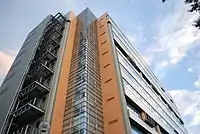
The university's Research Center for Prediction of Earthquakes and Volcanic Eruptions is represented on the national Coordinating Committee for Earthquake Prediction.[9]
Traditional number and configuration
( ) is Part-time lecturer.
| 総長 | 1 | ||
| 理事 | 8(1) | ||
| 監事 | 2(1) | ||
| 教員 | 3,168 | ||
| 教授 | 896 | ||
| 准教授 | 738 | ||
| 講師 | 193 | ||
| 助教 | 1,195 | ||
| 助手 | 146 |
Research institutes
- Research Institute of Electrical Communication (電気通信研究所, 通研, Denki Tsūshin Kenkyūsjo, Tsūken)[10]
- Institute of Development, Aging and Cancer (加齢医学研究所, Karei Igaku Kenkyūjo)[11]
- Institute of Fluid Science (流体科学研究所, Ryūtai Kagaku Kenkyūsyo)[12]
- Institute for Materials Research,IMR (金属材料研究所, 金研, Kinzoku Zairyō Kenkyūsjo, Kinken)[13]
- National Collaborative Research Institute
- Institute of Multidisciplinary Research for Advanced Materials (多元物質科学研究所, Tagen Busshitsu Kagaku Kenkyūjo)[14]
- International Research Institute of Disaster Science (災害科学国際研究所, Saigai Kagaku Kokusai Kenkyūjo)[15]
- Tohoku Medical Megabank Organization (東北メディカル・メガバンク機構, Tōhoku Medikaru Megabanku kikō)[16]
Centers and facilities
University library
University hospital
Inter-department institutes for education and research
|
Collaborating institutions
Administration unitTohoku University Overseas Office
Biomedical Engineering Research Organizatione-learning system
Dormitories
|
The 21st Century Center Of Excellence Programs
| Fiscal Year | Field | Program Title |
|---|---|---|
| 2002 | Life Sciences | Future Medical Engineering based on Bio-nanotechnology |
| Chemistry, material sciences | International Center of Research & Education for Unexplored Chemistry | |
| International Center of Research & Education for Materials | ||
| Information sciences, electrical and electronic engineering | System Construction of Global-Network Oriented Information Electronics | |
| Humanities | A Strategic and Education Center for an Integrated Approach to Language and Cognition | |
| 2003 | Medical sciences | Center for Innovative Therapeutic Development for Common Diseases |
| Mathematics, physics, earth sciences | Exploring New Science by Bridging Particle-Matter Hierarchy | |
| Advanced Science and Technology Center for the Dynamic Earth | ||
| Mechanical, civil, architectural and other fields of engineering | The Exploration of the Frontiers of Mechanical Science Based on Nanotechnology | |
| International COE of Flow Dynamics | ||
| Social sciences | Center for the Study of Social Stratification and Inequality | |
| Gender Law and Policy Center | ||
| 2004 | New scientific fields | Comprehensive Research and Education Center for Planning of Drug Development and Clinical Evaluation |
Academic rankings
| THE National[17] | General | 1 | |
|---|---|---|---|
| T. Reuters National[18] | Research | 4 | |
| Shimano National[19] | Selectivity | SA | |
| QS Asia (Asian Ranking version)[20] | General | 9 | |
| ARWU Asia[21] | Research | 8 | |
| THE World[22] | General | 132 | |
| QS World[23] | General | 77 | |
| ARWU World[21] | Research | 101-150 | |
| ENSMP World[4] | Alumni | 13 | |
Engineering | |||
|---|---|---|---|
| QS World[24] | General | 56 | |
MATERIALS SCIENCE | |||
| T.Reuters National[25] | Research | 1 | |
| T.Reuters World[25] | Research | 3 | |
PHYSICS | |||
| T.Reuters National[25] | Research | 2 | |
| T.Reuters World[25] | Research | 10 | |
CHEMISTRY | |||
| T.Reuters National[25] | Research | 4 | |
| T.Reuters World[25] | Research | 20 | |
BIOLOGY & BIOCHEMISTRY | |||
| T.Reuters National[25] | Research | 7 | |
| T.Reuters World[25] | Research | 113 | |
| Life Sciences | |||
IMMUNOLOGY | |||
| T.Reuters National[25] | Research | 6 | |
| T.Reuters World[25] | Research | 142 | |
PHARMACOLOGY & TOXICOLOGY | |||
| T.Reuters National[25] | Research | 3 | |
| T.Reuters World[25] | Research | 64 | |
| * T. Reuters World rankings include non-educational institutions | |||
Tohoku University is one of the most prestigious universities in Japan. It can be seen in the several rankings such as shown below.
General rankings
Tohoku University has been ranked first in the 2020 Times Higher Education Japan University Rankings.[26]
According to 2011 QS World University Rankings[27] the university rose to 70th having dropped out of the top 100 in 2010 to 102nd, and having been 97th in the 2009 THE-QS World University Rankings (in 2010 Times Higher Education World University Rankings and QS World University Rankings parted ways to produce separate rankings).
It was also ranked 49th worldwide according to the Global University Ranking in 2009.[28]
Research performance
Tohoku University is one of the top research institutions in Japan. According to Thomson Reuters, Tohoku University is the fourth best research university in Japan.[18] Its research excellence is especially distinctive in Materials Science (1st in Japan, third in the world), Physics (2nd in Japan, tenth in the world), Pharmacology & Toxicology (3rd in Japan, 64th in the world) and Chemistry (6th in Japan, 20th in the world).[29]
Times Higher Education also reported that Tohoku University was ranked 3rd in Japan (201st - 250th in the world) for the World University Rankings 2022 by Subject: social sciences.[30] The social sciences ranking includes the weightings such as Research: volume, income and reputation (accounts for 32.6 per cent) and Citations: research influence (accounts for 25 per cent).[31]
In addition, Nature Index ranked Tohoku University as 5th in Japan (103rd in the world, 38th in Asia Pacific) on 2022 tables: Institutions.[32] The 2022 tables are based on Nature Index data from 1 January 2021 to 31 December 2021. Before the 2022 edition, Nature Index also ranked Tohoku University as 5th in Japan (77th in the world, 28th in Asia Pacific) on 2021 tables: Institutions, that are based on Nature Index data from 1 January 2020 to 31 December 2020.[33]
According to the Qs World university rankings on 2012/9 surveyed about the general standards in Engineering&Technology field, Tohoku university was placed 56th (world), fifth (national).[34]
As Tohoku University has been emphasizing 'practical' research, Tohoku received the top place for its number of patents accepted (324) during 2009 among Japanese Universities.[35]
Graduate school rankings
Tohoku University Law School is one of the most famous Law schools in Japan, as it was ranked fifth in the passing rate of Japanese Bar Examination in 2020.[36]
Alumni rankings
Mines ParisTech : Professional Ranking World Universities ranks Tohoku University as 13th in the world (5th in Japan) in 2011 in terms of the number of alumni listed among CEOs in the 500 largest worldwide companies.[37]
Popularity and selectivity
Tohoku University is one of the most selective universities in Japan. Its entrance difficulty is usually considered one of the top in Japan. Japanese journalist Kiyoshi Shimano ranks its entrance difficulty as SA (most selective/out of 11 scales) in Japan.[38]
Evaluation from business world
| Ranking | |
|---|---|
| Japan | 3rd[39] (out of 788[40] universities in Japan as of 2021) |
| Source | 2021 Nikkei Survey[41] to all listed (3,714[42]) and leading unlisted (1,100), totally 4,850 companies[41] |
People
Successive presidents
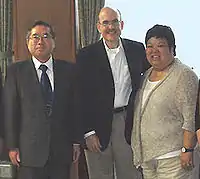
|
|
Notable people associated with Tohoku University
Many world-class celebrities have attended or served at Tohoku University.
Sciences
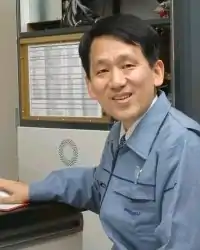 Koichi Tanaka (田中 耕一), chemist, 2002 Nobel Prize in Chemistry winner
Koichi Tanaka (田中 耕一), chemist, 2002 Nobel Prize in Chemistry winner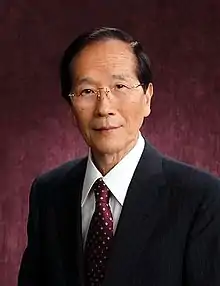 Akira Endo (遠藤 章), biochemist, known for the discovery of first statin
Akira Endo (遠藤 章), biochemist, known for the discovery of first statin Atsuto Suzuki (鈴木 厚人), physicist, 2016 Breakthrough Prize in Fundamental Physics winner
Atsuto Suzuki (鈴木 厚人), physicist, 2016 Breakthrough Prize in Fundamental Physics winner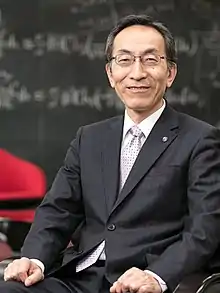 Hideo Ohno (大野 英男), physicist, the 22nd president of Tohoku University
Hideo Ohno (大野 英男), physicist, the 22nd president of Tohoku University
- Hitoshi Oshitani (押谷仁), scientist, virologist and public health expert
- Tetsuo Nozoe (野副 鉄男), chemist, known for hinokitiol
- Tsutomu Ōhashi (大橋 力), artist and scientist, Doctor of Agriculture
- Syun-Ichi Akasofu (赤祖父 俊一), geophysicist, the founding director of the International Arctic Research Center of UAF
- Hiroshi Maeda (前田 浩), pharmacologist and chemist, known for discovery of EPR effect
- Morio Kasai (葛西 森夫, 1922–2008), a surgeon who developed the Kasai procedure for biliary atresia[43]
- Chen Wei-jao (陳維昭), a surgeon and president of National Taiwan University
- Lo Tung-bin (羅銅壁), biochemist, pioneer in the research on proteins in Taiwan
- Susumu Satomi (里見 進), a surgeon and president of Tohoku University
- Ryuta Kawashima (川島 隆太), neuroscientist, currently resident professor, the supervisor of Nintendo DS gamesofts; Brain Age: Train Your Brain in Minutes a Day! and Dr. Kawashima's Brain Training: How Old is Your Brain?
- Noriko Osumi (大隅 典子), neuroscientist, the vice president of Tohoku University (2018–)
- Mahmoud Nili Ahmadabadi, president of University of Tehran
Engineering
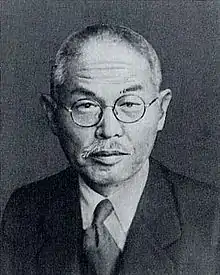 Kotaro Honda (本多 光太郎), former president, 1932 Nobel Prize in Physics nominee
Kotaro Honda (本多 光太郎), former president, 1932 Nobel Prize in Physics nominee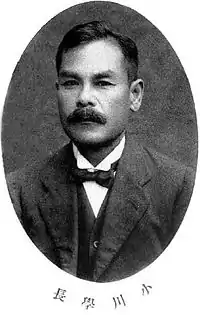 Masataka Ogawa (小川 正孝), former president, known for the discovery of rhenium
Masataka Ogawa (小川 正孝), former president, known for the discovery of rhenium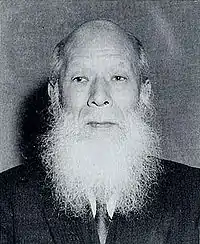 Hidetsugu Yagi (八木 秀次), electrical engineer, mentor of Yagi–Uda antenna
Hidetsugu Yagi (八木 秀次), electrical engineer, mentor of Yagi–Uda antenna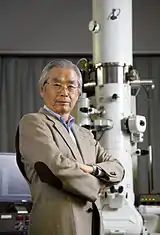 Sumio Iijima (飯島 澄男), physicist, inventor of carbon nanotubes
Sumio Iijima (飯島 澄男), physicist, inventor of carbon nanotubes
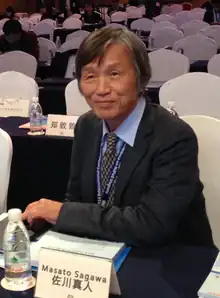 Masato Sagawa (佐川眞人), inventor of sintered NdFeB magnets, the winner of 2022 Queen Elizabeth Prize for Engineering[44]
Masato Sagawa (佐川眞人), inventor of sintered NdFeB magnets, the winner of 2022 Queen Elizabeth Prize for Engineering[44]
- Shintaro Uda (宇田 新太郎), an inventor of the Yagi-Uda antenna 1926, the ubiquitous television antenna
- Jun-Ichi Nishizawa (西澤 潤一), the engineer known for inventing optical communication systems including optical fiber, laser diode and so forth, PIN diode and SIT/SITh
- Fujio Masuoka (舛岡 富士雄), the developer of Flash Memory
- Masayoshi Esashi (江刺 正喜), engineer, the global authority of Microelectromechanical systems
- Toshitada Doi (土井 利忠), a pioneer in digital audio, originated Aibo the pet robot
- Fumihiko Imamura (今村 文彦), civil engineer, the natural disaster expert for NHK after 2011 Tōhoku earthquake and tsunami[45]
- Masataka Nakazawa (中沢 正隆), pioneer of optical solitons in high-speed optical communication in fiber optic networks and rare earth-doped optical amplifiers (such as EDFA)
Literature and art
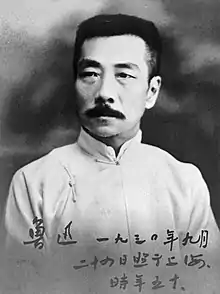 Lu Xun (魯迅), the greatest writer in modern China
Lu Xun (魯迅), the greatest writer in modern China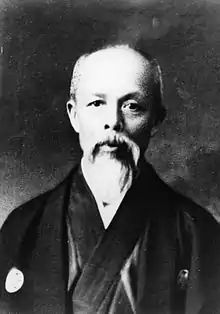 Reizan Ido (井土 霊山), a journalist, writer, poet, and involved in Freedom and People's Rights Movement
Reizan Ido (井土 霊山), a journalist, writer, poet, and involved in Freedom and People's Rights Movement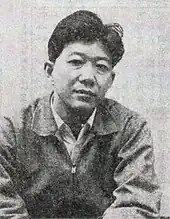 Morio Kita (北 杜夫), novelist, 1960 Akutagawa Prize winner
Morio Kita (北 杜夫), novelist, 1960 Akutagawa Prize winner
- Ben Goto (五島 勉), a Japanese writer
- Hayao Hamada (浜田 隼雄), a Taiwanese author
- Tadao Ooike (大池 唯雄), novelist, 1938 Naoki Prize winner
- Yō Tsumoto (津本 陽), novelist, 1978 Naoki Prize winner
- Akihiko Nakamura (中村 彰彦), novelist, 1994 Naoki Prize winner
- Kenichi Satō (佐藤 賢一), novelist, 1999 Naoki Prize winner
- Toh EnJoe (円城 塔), author, 2012 Akutagawa Prize, Nihon SF Taisho Award, and 2013 Seiun Award winner
- Yuichi Kodama (児玉 裕一), a Japanese video director
- Kazumasa Oda (小田 和正), one of the most famous musicians in pop music in Japan since the 1970s
- Kōtarō Isaka (伊坂 幸太郎), a mystery fiction writer, Japan Booksellers Award and Yamamoto Shūgorō Prize winner
- Hideaki Sena (瀬名 秀明), a science fiction writer and Nihon SF Taisho Award winner
- Chūsei Sone (曽根 中生), a Japanese film director and screenwriter
- Kenji Suzuki (鈴木 健二), an announcer of the NHK
- Chinggeltei (1924–2013), a Mongolist, the former vice-rector of Inner Mongolia University[46]
Mathematic, economics and business
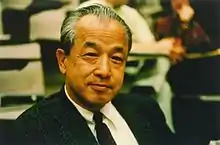
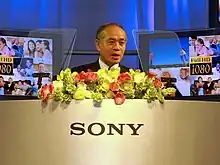 Ryōji Chūbachi (中鉢良治), a Japanese businessman, former vice chairman and president of Sony Corporation
Ryōji Chūbachi (中鉢良治), a Japanese businessman, former vice chairman and president of Sony Corporation
- Nobuhiko Kawamoto (川本 信彦), CEO of Honda Motor until 1995
- Hirofumi Uzawa (宇沢 弘文), an economist, the father of Theoretical Economics in Japan
- Su Buqing (蘇歩青), a Chinese mathematician and former president of Fudan University
- Chen Jiangong (陈建功), pioneer of modern Chinese mathematics
- Yasumasa Kanada (金田 康正), a mathematician most known for his numerous world records over the past two decades for calculating digits of π
- Shigeo Sasaki (佐々木 重夫), a professor emeritus and mathematician who introduced the Sasaki manifold
Politics
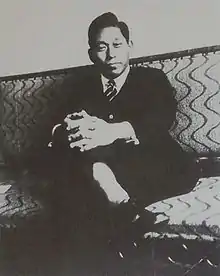 Shigeyoshi Matsumae (松前 重義), a Japanese politician, electrical engineer, and founder of Tokai University
Shigeyoshi Matsumae (松前 重義), a Japanese politician, electrical engineer, and founder of Tokai University.jpg.webp)
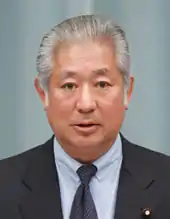 Eisuke Mori (森 英介), a Japanese politician of the Liberal Democratic Party
Eisuke Mori (森 英介), a Japanese politician of the Liberal Democratic Party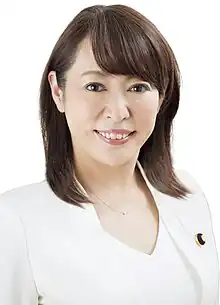 Masako Mori (森 まさこ), a Japanese politician of the Liberal Democratic Party
Masako Mori (森 まさこ), a Japanese politician of the Liberal Democratic Party
- Masayuki Aoyama (青山 雅幸), Japanese politician in the House of Representatives
- Mitsuru Sakurai (桜井 充), Japanese politician of the Democratic Party of Japan
- Kenya Akiba (秋葉 賢也), a Japanese politician of the Liberal Democratic Party
- Akira Koike (小池 晃), a Japanese politician of Japanese Communist Party
- Nori Sasaki (佐々木 紀), Japanese politician of the Democratic Party of Japan
- Yoshihisa Inoue (井上 義久), Japanese politician of the New Komeito Party
- Emiko Okuyama (奥山 恵美子), Mayor of Sendai, 2009–2017
See also
References
- Designated National University | Tohoku University Global Site
- "Japan University Rankings 2022". Times Higher Education (THE). 2022-03-16. Retrieved 2022-07-06.
- "Japan University Rankings 2020". 19 March 2020.
- "ENSMP World University Rankings" (PDF). École nationale supérieure des mines de Paris. 2011. Retrieved April 29, 2011.
- Tohoku University Annual Review Tohoku University's official website accessed June 2018
- on castle grounds, Tokuku.ac.jp, Retrieved 17 August 2016
- "History of Tohoku University Campus". tohoku.ac.jp. Tohoku University. Retrieved 7 April 2012.
- "Important notices from Tohoku University (11:00 AM, March 14th, 2011)".
- Organizations with ties to CCEP CCEP, accessed 2011-03-19
- Research Institute of Electrical Communication On Tohoku University's official website accessed at December 15, 2008
- Institute of Development Aging and Cancer On Tohoku University's official website accessed at December 15, 2008
- Institute of Fluid Science On Tohoku University's official website accessed at December 15, 2008
- Institute for Material Research Archived 2007-08-17 at the Wayback Machine On Tohoku University's official website accessed at December 15, 2008
- Institute of Multidisciplinary Research for Advanced Materials On Tohoku University's official website accessed at December 15, 2008
- "IRIDeS - International Research Institute of Disaster Science". Retrieved 15 July 2015.
- "ToMMo | Tohoku Medical Megabank Organization". ToMMo | Tohoku Medical Megabank Organization (in Japanese). 2015-02-10. Retrieved 2021-12-24.
- "Japan University Rankings 2022". Times Higher Education. 2022. Retrieved July 22, 2022.
- "Thomson Reuters 20 Top research institutions in Japan". Thomson Reuters. 2011. Retrieved July 22, 2022. (this raking includes 5 non-educational institutions)
- "GBUDU University Rankings" (in Japanese). YELL books. 2009. Retrieved April 29, 2011.
- "QS Asian University Rankings". QS Quacquarelli Symonds Limited. 2016. Retrieved September 24, 2017.
- "Academic Ranking of World Universities". Institute of Higher Education, Shanghai Jiao Tong University. 2017. Retrieved September 24, 2017.
- "THE World University Rankings". Times Higher Education. 2018. Retrieved September 24, 2017.
- "QS World University Rankings". QS Quacquarelli Symonds Limited. 2018. Retrieved September 24, 2017.
- "QS topuniversities world rankings in Engineering field". Topuniversities. 2012. Retrieved July 20, 2012.
- "Thomson Reuters 10 Top research institutions by subject in Japan" (in Japanese). Thomson Reuters. 2010. Retrieved May 11, 2011.
- 「THE世界大学ランキング日本版2020」東北大学が初のトップに|THE世界大学ランキング 日本版
- "QS World University Rankings 2011/12". topuniversities.com. Quacquarelli Symonds Limited. Archived from the original on 1 October 2011. Retrieved 7 April 2012.
- http://www.globaluniversitiesranking.org/images/banners/top-100(eng).pdf
- "Thomson Reuters 20 Top research institutions in Japan" (in Japanese). Thomson Reuters. Archived from the original on 2011-06-13. (this ranking includes non-educational institutions)
- "World University Rankings 2022 by subject: social sciences". Times Higher Education (THE). 2021-09-28. Retrieved 2022-07-21.
- "World University Rankings 2022 by subject: social sciences methodology". Times Higher Education (THE). 2021-10-06. Retrieved 2022-07-21.
- "2022 tables: Institutions | Annual tables | Nature Index". www.natureindex.com. Retrieved 2022-07-21.
- "2021 tables: Institutions | Annual tables | Nature Index". www.natureindex.com. Retrieved 2022-07-21.
- "QS world university ranking(2012)". topuniversities.com. Retrieved September 18, 2012.
- "13.2009年国内大学別特許公開件数 | 特許庁 アーカイブ" (PDF). Archived from the original (PDF) on 2011-03-24. Retrieved 2022-07-21.
- "令和2年司法試験法科大学院等別合格者数等(合格率順)" (PDF). Archived from the original (PDF) on 6 July 2022. Retrieved 6 July 2022.
- "INTERNATIONAL PROFESSIONAL RANKING OF HIGHER EDUCATION INSTITUTIONS 2011 SURVEY | MINES ParisTech" (PDF). Archived from the original (PDF) on 2011-07-20. Retrieved 2022-07-21.
- 危ない大学・消える大学 2012年版 (in Japanese). YELL books. 2011. ASIN 4753930181.
- Survey on the image seen from human resources personnel:Ranking of the ability to get jobs|Nikkei HR 2021.06.02 release
- The number of universities in Japan is 788 as of April 1, 2021.|Ōbun Sha
- Image held by human resources personnel of companies of Japan / Valuation from the ex-students already employed / The Nikkei・Nikkei HR Survey 2021-06-02
- Number of listed companies & listed shares of stock|JPX
- Garcia, Alejandro V.; Cowles, Robert A.; Kato, Tomoaki; Hardy, Mark A. (2012-05-01). "Morio Kasai: a remarkable impact beyond the Kasai procedure". Journal of Pediatric Surgery. 47 (5): 1023–1027. doi:10.1016/j.jpedsurg.2012.01.065. ISSN 1531-5037. PMC 3356564. PMID 22595595.
- "Queen Elizabeth Prize for Engineering honours magnet pioneer". BBC News. 1 February 2022.
- CNN rebroadcasting NHK, 13 March 2011.
- "草原名人:开创蒙古语言研究黄金时期的清格尔泰 (zh) Cǎoyuán míngrén: Kāichuàng ménggǔ yǔyán yánjiū huángjīn shíqí de qīng gé ěr tài [Famous man of the steppe: Chinggaltai, who pioneered the golden age of Mongolian language research]". People's Daily. 2007-07-19. Retrieved 2010-06-02.